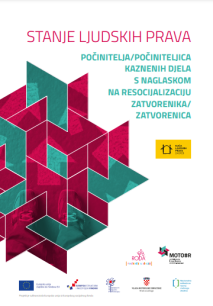"The Human Rights Situation of Criminal Offenses Perpetrators with an Emphasis on the Resocialization of Prisoners"

Thematic report entitled "The Human Rights Situation of Criminal Offenses Perpetrators with an Emphasis on the Resocialization of Prisoners" was created as a result of a research conducted by the House of Human Rights Zagreb, as part of the project "Moto#R - Motivating and empowering until resocialization" from July to December 2020. The goal of this thematic research is to contribute to a better understanding of resocialization and the impact of resocialization on the training of male/female prisoners for life in freedom, both on a normative level and in practice, as well as to examine the challenges and obstacles faced by prisoners and competent authorities in implementing resocialization. The research also sought to identify good practices in the implementation of resocialization of male/female prisoners, with the aim of the analysis and recommendations for improving existing practices.
In order to obtain a comprehensive picture of the state of human rights of perpetrators of criminal acts, with an emphasis on their resocialization, the research was conducted in three phases. The first phase of the research included a review and analysis of the existing legal framework related to the resocialization of prisoners, their rights, obligations and benefits within the prison system. The second phase refers to the creation of an interview protocol and mapping the relevant stakeholders in the implementation of resocialization of male/female prisoners. In the third phase of the research, 18 semi-structured interviews were conducted with seven criminal authorities, four public authorities (Ministry of Justice and Administration and Centers for social welfare), two independent institutions and five civil society organizations that contribute to the resocialization of prisoners and their families.